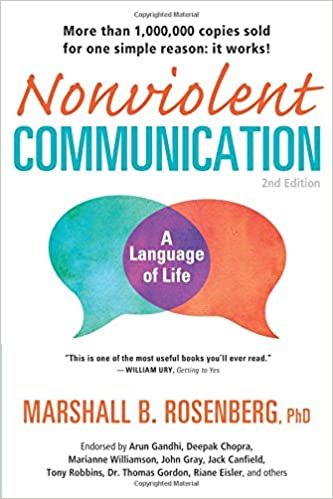This is a follow-up to my recent article 'Political correctness: self-imposed mental slavery'. After reading a few responses, I want to take this opportunity to clarify my position and make a few additional points.
There is sometimes a tension between people speaking openly and honestly, and sensitivity to the feelings of others. There is great value in being compassionate, but on the other hand, sometimes it is necessary to say things that will inevitably result in hurt feelings. Not because cruelty is necessary, but because there are uncomfortable truths. What I am objecting to is not individuals taking it upon themselves to be more careful with their language, so as to avoid saying things that will result in other people feeling hurt unnecessarily. I hope to clarify here what it is I object to.
My recent study of ‘nonviolent communication’ (NVC) has helped me to understand this better for myself. Briefly, the idea is that we as human beings all have needs, and we also have emotional responses to those needs being met or not. Certain things that people say, or ways of speaking, contribute to other people not getting those needs met, e.g. the need to feel safe, welcome, included, understood, appreciated, etc.

Suppose you say something (for instance, using a word that had derogatory connotations) that results in a member of an ethnic minority feeling upset or scared, because their need to feel welcome, or safe, is not being met. They may respond by accusing you of having said something racist, or worse, of being a racist. These statements are judgments. Behind them lies an expression of the unmet need. (Let us ignore cases of "virtue-signalling" for present purposes.)
Tragically, the member of the ethnic minority has spoken in a manner which is unlikely to result in their need being met. The other person is likely to respond in one of three ways.
The first way is to get defensive: “I’m not a racist, I have lots of friends who are ____!” This response will fail to reassure the member of the ethnic minority.
The second is to feel afraid of the social consequence of being labelled a racist, give in to the demands and begrudgingly speak differently, without actually empathizing with the other person, and understanding how they were affected by what you said.
The third is what I was referring to in my recent article. It is to internalize the message that thinking certain thoughts is racist, and makes you a bad person. You therefore prevent yourself from thinking that way, not out of empathy or understanding, but out of guilt. This is what I refer to as ‘mental slavery’.
This approach, of attacking and making accusations of various –isms and –phobias against anyone who doesn’t meet the standards of “political correctness”, is what I object to. It would be far better if people could learn to express themselves in a way that promotes greater empathy and understanding (myself included). This would mean never making the charge of “politically incorrect”, because the term does not explain how what the person has said is contributing to someone’s needs not being met.
Now, the charge has been made that certain types of people (for instance, “right-wingers”) simply lack sufficient empathy, and therefore should be socially attacked and shamed into submission to political correctness (I paraphrase, of course). I do not believe that this is the case for the vast majority of people, but rather I think that people are unwilling to consider the feelings and needs of people who they think are attacking them (and perhaps are).
To give one example of the harm I see political correctness doing, many people will not allow themselves to question the value of multi-culturalism and diversity, for fear that doing so would make them racist. Others question it, but don’t speak up, out of fear of chastisement.
However, there are serious challenges, and legitimate concerns that people have with regards to this. When a large number of outsiders move into a formerly culturally homogenous community, with their own languages, religions, and cultural practices, this has a drastic effect on social cohesion. For instance, people stop talking to their neighbours, just because it’s so much more effort, and there’s a significant risk of unintentionally causing offence. Many people have experience a noticeable drop in quality of life as a result of this.
There are other challenges associated with multi-culturalism as well. Over time, resentment grows from people that do not feel that their concerns have been listened to and taken seriously (rather, those that do say something, admittedly often poorly, are branded ‘racist’). As a result of this growing resentment, I fear significant violence will eventually break out, likely in the form of far-right parties gaining political power.
I don’t claim to know what the answer is to these challenges, but I do believe that violence would be a lot less likely to occur if we had a cultural dialogue where everyone feels that they have been heard, and their needs have been understood. THAT is why political correctness is so dangerous, and should be replaced with an emphasis on helping people to develop genuine empathy and compassion.
Thanks for interesting opinion on communication and our society. I think that it's very important "to develop genuine empathy and compassion".
I would like to include your article in my TOP5 Lucky Find Psychology articles for today.
That would be awesome, thank you
Here's a link where your post is being featured:
https://steemit.com/psychology/@aleksandraz/daily-psychology-it-s-a-lucky-find-17-today-s-top-5